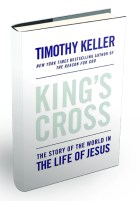
The doctrine of substitutionary atonement] will be hard for you if you're among those who struggle with the Christian teaching about the Cross. It's natural to assume that [Mark 10:45] is giving us one more example of those ancient, primitive, bloodthirsty gods worshiped by those ancient, primitive, bloodthirsty societies. In The Iliad by Homer, for example, Agamemnon doesn't get fair winds to Troy until he sacrifices his daughter. That appeases the wrath of the gods, and then they let him go to Troy. What Jesus says in Mark may seem to be just another variation on that theme: a savage ancient culture, ruled over by an irritable god, demanding blood sacrifices for the release of innocent slaves and prisoners.
But that's not what's going on here at all. And why not, you may say? If God is really a loving God, why doesn't he just forgive everybody? Why did Jesus have to go through suffering into death? Why did he have to be a ransom?
Here's the beginning of an answer: Jesus didn't have to die despite God's love; he had to die because of God's love. And it had to be this way because all life-changing love is substitutionary sacrifice.
Think about it. If you love a person whose life is all put together and has no major needs, it costs you nothing. It's delightful. There are probably four or five people like that where you live. You ought to find them and become their friend. But if you ever try to love somebody who has needs, someone who is in trouble or who is persecuted or emotionally wounded, it's going to cost you. You can't love them without taking a hit yourself. A transfer of some kind is required, so that somehow their troubles, their problems, transfer to you.
There are a lot of wounded people out there. They are emotionally sinking, they're hurting, and they desperately need to be loved. And when they are with you, you want to look at your watch and make a graceful exit, because listening to them with all their problems can be grueling. It can be exhausting to be a friend to an emotionally damaged person. The only way they're going to start filling up emotionally is if somebody loves them, and the only way to love them is to let yourself be emotionally drained. Some of your fullness is going to have to go into them, and you have to empty out to some degree. If you hold on to our emotional comfort and simply avoid those people, they will sink. The only way to love them is through substitutionary sacrifice.
Used by permission of the publisher. All rights reserved.
Copyright © 2011 Christianity Today. Click for reprint information.
Related Elsewhere:
Christianity Today articles by or about Tim Keller include:
Tim Keller: What We Owe the Poor | The pastor of Redeemer Presbyterian Church says seeking justice is not optional for the person saved by grace. (December 6, 2010)
How Tim Keller Found Manhattan | The pastor of Redeemer Church is becoming an international figure because he's a local one. (June 5, 2009)
The Advent of Humility | Jesus is the reason to stop concentrating on ourselves. (December 22, 2008)
Tim Keller Reasons with America | The New York pastor explains why he's taking his ministry model on the road. (June 20, 2008)
A New Kind of Urban Christian | As the city goes, so goes the culture. (May 1, 2006)










